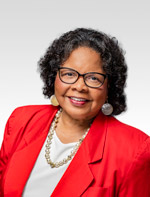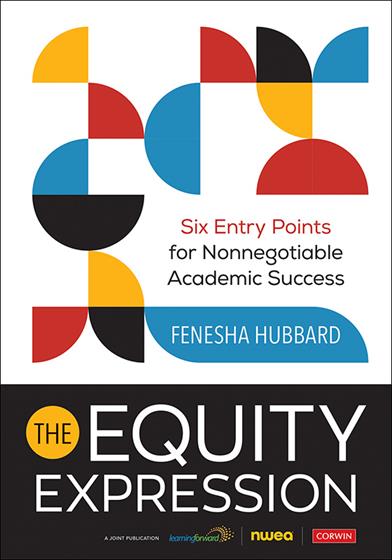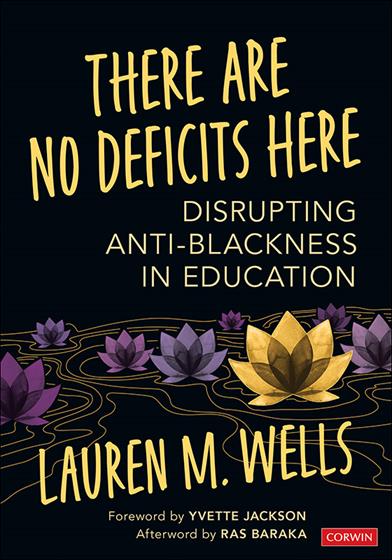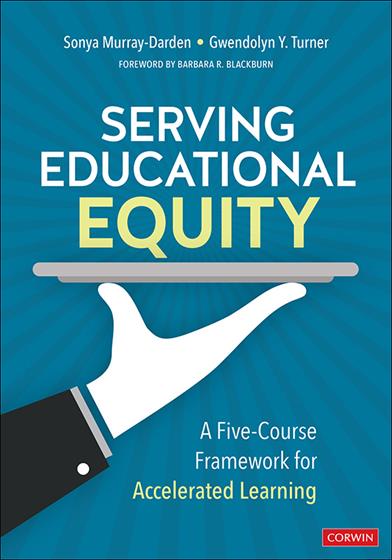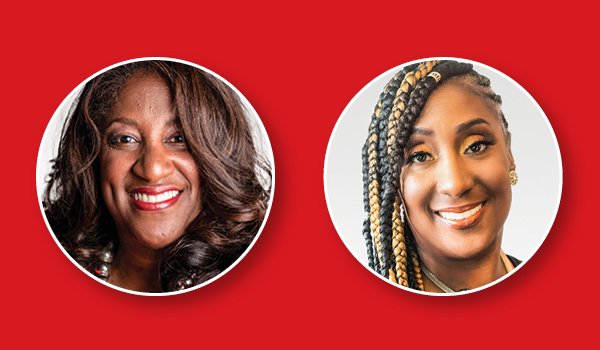Series 6 Leaders Coaching Leaders
[00:00:00.00] [MUSIC PLAYING]
[00:00:00.34] NARRATOR: Welcome to Corwin's Leaders Coaching Leaders podcast
with host, Peter Dewitt. This podcast is from education leaders for education
leaders. Every week, Peter and our guests get together to share ideas, put
research into practice, and ensure every student is learning not by chance but
by design.
[00:00:19.45] TANYA GHANS: Hey, Peter.
[00:00:20.59] PETER DEWITT: Hey, Tanya. How are you?
[00:00:22.58] TANYA GHANS: I'm great. How are you?
[00:00:24.46] PETER DEWITT: I'm doing well. It's always good to see you.
[00:00:26.41] TANYA GHANS: Good to see you. I just automatically smile when
I see you. You're just one of those people.
[00:00:30.49] PETER DEWITT: That's how I feel. Even when I get an email or a
text from you, I'm like, oh, it's Tanya. It will always feels that way when I
get texts and emails.
[00:00:39.82] TANYA GHANS: And it's genuine leader. It's genuine listeners,
it really is. So yes, let's talk a little bit about today's guest. There's
another exciting session.
[00:00:47.13] PETER DEWITT: Yeah, so Sonya Murray and Gwendolyn Turner. I
actually met Sonya in Missouri, I was given a keynote. And she came up after,
and she was a burst of energy. And she said, "I just wrote a book for
Corwin." And she handed me a bookmark with her picture on it. And I
thought, wow, I've never thought about doing that before. But it worked, it was
fantastic. And I said, "I want you on the podcast. I want to hear
more."
[00:01:17.66] And so yeah, it's going to be Sonya Murray and Gwendolyn Turner.
And it to me it was a fantastic conversation because they talk about this
five-course framework. And we'll get more into that about where the five
courses came from. But I just-- I really enjoyed this conversation about
serving up equity.
[00:01:38.09] TANYA GHANS: Yeah, I like the feel of these two authors. They
were fun to watch, good energy going. One thing that I think listeners will
appreciate, which I appreciated, they're talking about equity again, another
term that's become very loaded and it's all over the place. And I think they
really do a good job at defining what they mean by it.
[00:01:56.21] And I love how they center high standards and a desire for
excellence from students. That even though, when we're talking about one thing,
many people don't mean to parse it out and silo it, but it's very easy for
things to become siloed when you get focused about talking with one term. So
then we seem to be in this place where we have to remind everyone, ourselves,
that it's not one or the other that we're bringing all of these things together
holistically. And I think they do a nice job of trying to just make sure that
these concepts stay as rich as they were conceived of. So I was excited about
just the way that they speak on the topic.
[00:02:41.75] PETER DEWITT: Yeah, equity is one of those words that needs
clarity because I think there's the political side, there's the pushback, but
there's also just the common understanding of what do you mean when you're
talking about equity?
[00:02:56.45] And I'll tell you for those of us old enough, Tanya, you
wouldn't be one of them, but we remember the commercials with EF Hutton. And
when EF Hutton talks, you listen. And that's how Gwendolyn Turner actually came
off to me. Like, as soon as I asked her a question, she just took the moment to
breathe and then she just talks slowly, and I found myself just kind of leaning
in. And on the other side, you've got Sonya who's just a burst of energy too.
So I love the juxtaposition between the two of them, especially during the
conversation.
[00:03:35.83] So listeners, you're thoroughly going to enjoy the
conversation, especially when they start talking about the reasoning behind
calling it the five-course framework. I really loved what they did with that.
So enjoy the--
[00:03:50.26] TANYA GHANS: And analogies. And analogy was fun. Listeners,
enjoy. And we will see you on the other side.
[00:03:56.92] [AUDIO LOGO]
[00:03:59.50] PETER DEWITT: Sonya Murray and Gwen Turner, welcome to the
Leaders Coaching Leaders podcast.
[00:04:04.16] GWENDOLYN TURNER: Thank you.
[00:04:05.15] SONYA MURRAY: Thank you for having us.
[00:04:07.78] PETER DEWITT: It's such a great energy. People will typically
just listen to the podcast but it's going to be-- it's offered on YouTube as
well. So hopefully they'll be able to click over and see the video too because
you both have great energy to be able to talk about.
[00:04:21.90] But I want to talk to you because Sonya, we saw each other in
Missouri?
[00:04:27.26] SONYA MURRAY: We did.
[00:04:28.49] PETER DEWITT: We met at Saint Louis about a month ago, which
was fantastic. And you came running up to me and we had a really great
conversation. And I thought you both would be such a great guest. You also gave
me a bookmark. I don't give bookmarks out. Not too many authors have bookmarks.
And that was cool because I actually found-- I still have it, actually so--
[00:04:51.59] GWENDOLYN TURNER: Excellent.
[00:04:52.40] PETER DEWITT: So that's a good thing to have. But the book is
called, Serving Educational Equity, A Five-Course Framework for Accelerated
Learning.
[00:05:01.05] GWENDOLYN TURNER: Yes.
[00:05:02.10] PETER DEWITT: Congratulations on the book.
[00:05:03.85] GWENDOLYN TURNER: Thank you.
[00:05:04.57] SONYA MURRAY: Thank you.
[00:05:05.73] PETER DEWITT: It is a labor of love when you write a book.
[00:05:08.16] GWENDOLYN TURNER: Yes.
[00:05:08.82] SONYA MURRAY: Yes, it is.
[00:05:10.08] PETER DEWITT: So tell me a little bit-- Sonya, I'll start with
you. Tell me a little bit about why you focused on the whole idea of-- I mean,
these are pretty specific words, serving educational equity. What got you
involved in writing this book?
[00:05:29.90] SONYA MURRAY: So I've been in education for decades. I tell
people sometimes I started when I was two years old, right? That's what I say.
But I wanted alongside Gwen to build on the work of Linda Darling-Hammond and
her research around the science of learning. We kept going in and out of
schools and seeing that leaders wanted some support around how to meet the
needs of all of their students.
[00:06:01.41] It was during the time of the disruption in education, and we
wanted to really offer not just in theory but in practice some real life
application and real-time strategies that they could use to accelerate
learning. And so we wanted to return all educators back to what has always
worked in schools. And that would be that caring adult who centers students,
who deeply affirms them and engages them in those safe, culturally-affirming
spaces.
[00:06:36.06] That's could be challenging, we recognize that. But we want it
truly for leaders, for teachers, everybody who interacts with the student to
have real-time strategies that they could use in order to get students to do
grade level work no matter their ability level or grade level. And that's my
personal why, it has always been my why in every role that I've had.
[00:07:02.64] And I currently support leaders in my role as CEO of Equity
Matters and I also support leaders with the Missouri Leadership Development
System through Education Plus, so this has been my passion. And so I kept
getting the same requests every time I would go into schools and I said, well,
why don't we put it in a book? Put it in a book and then we could support
leaders and help them to be successful. So that was that.
[00:07:30.11] PETER DEWITT: That's usually how it happens, so that's great,
actually. So Gwen, how did you get involved in this work?
[00:07:37.08] GWENDOLYN TURNER: Mine started a long time ago. And I always
tell Sonya, my why started-- and I'm going to give my age away now, in the
'50s, when we were involved in school and the expectation was excellence. There
were no excuses. I reminded Sonya and of course, she always laughs at me.
[00:08:01.17] And I said, when I was a child in school, one of the things
that we were expected to do was to read the newspaper in school because people
in the community did not have access to the paper. And our teacher in second
grade expected us to take the paper, to read it. And as a part of sharing what
had happened in school that day, we had to go back, and we had to be the source
of information for parents and for others in the community. So as children, we
were taught to respect learning. And the expectation wasn't that because you
were a small child you could only do so much.
[00:08:49.53] And so Sonya and I came to this work from she had a passion
about working with children and I had a passion with working with teachers and
other leaders to make sure that we never forget that we have to hold the
highest expectations for children. And they will live up to them. They will
live up to them.
[00:09:10.02] PETER DEWITT: That's really interesting, especially if you
have a juxtaposition to what we're experiencing now in some of states where the
thought of having elementary school kids read the newspaper and then bring the
information back to their parents, that's a really controversial thing these
days, isn't it? So it's really interesting that that was the experience that
you had. What an amazing experience actually.
[00:09:37.41] One of the things that you talked about was the whole idea of
affirming spaces Sonya. So could you talk a little bit about what you mean by
affirming spaces? Because one of the things that I really like to be able to
do, whether it's in the work that I do or on this podcast, is develop a common
language and a common understanding. And I think we often use a common language
in education, but we don't always have that common understanding.
[00:10:04.18] So when you mention affirming space, what does that look like?
What does that mean?
[00:10:08.82] SONYA MURRAY: It's such a great question. Well, to begin, it
means that you see students. You truly see them and you hear them. And
specifically, you see them, and I always say, independent of your own
preconceived notions and biases about their abilities. We all bring to the
learning space that bias. And sometimes people hear the word bias and they
think it's all bad, but we function day in and day out making quick assumptions
about situations, about people.
[00:10:41.89] And so when I talk about culturally-affirming students, it's
really thinking about and recognizing that they are bringing their own
background and experiences to that learning space, to the school, and to the
classroom. And so as an educator, if I'm going to get them to a high level
academically, I cannot create roadblocks intentionally or unintentionally that
would not allow them to experience or have access to high expectations.
[00:11:15.30] And so we loved Dr. Linda Darling-Hammond's whole idea about
the whole child approach and the science of learning around that, where she
talks about the brain always developing as a product of relationships and
experiences. That learning is not just social, it's social, it's emotional, and
it's academic. So when we say culturally affirm students, we have to recognize
that and see them fully.
[00:11:43.74] Now, that's challenging because we think about the amount of
responsibility everybody has, principals, teachers. No matter your level, if
you're in the education space, you have a lot of responsibility. Which is why
we created a five-course framework to help people to make those connections so
that we don't see just one part of the student, we actually see ways to affirm
them completely.
[00:12:10.23] PETER DEWITT: That setting the environment is so important.
And it's not just for students either, it's for teachers when we're providing
professional learning, that whole focus of on the experience that they can
have. Just we know, I mean, self-efficacy research shows that if you're
anxious, it diminishes efficacy and if you're excited, it increases efficacy.
[00:12:33.78] Gwen, you were shaking your head when Sonya was talking. Could
you talk to us a little bit more about what the five courses are?
[00:12:43.19] GWENDOLYN TURNER: Yes. What we tried to do was think in terms
of an analogy of what we do when planning meals. And I'm going to give you guys
a big secret here. I'm going to reveal I'm a terrible cook. But when we were
thinking of an analogy, we thought in terms of meal planning. In our
five-course framework, one of the things that we thought about was the importance
of meal-planning. If I'm going to plan for equity and excellence and education,
it doesn't happen by having stance, I think very carefully about what I am
doing.
[00:13:23.11] So if I could say the first thing that I do is I not only plan
but I prioritize, how am I going to embrace equity? And what is my focus for
accelerating learning? And then as with any meal, we think in terms of breaking
it down into courses. And if I think in terms of first course, Sonya and I
debated and we said OK, it should be the soup course. And the soup course, I
want to basically view how I am looking at equity and how I would practice
those interactions.
[00:14:02.08] Sonya talks about relationships. And one of the things that we
all know is when a teacher and a student have a good relationship, learning can
take place. When you've got barriers to that relationship, you are going to
have to overcome them.
[00:14:19.90] As we moved into looking at how we viewed equity, we moved
into our next course. And our next course, again, we are not cooks but we
thought in terms of an appetizer. And it is so important in an educational
setting for us to look at two things. I think the data. The data just reveals
what has happened, where we are, and possibly where we will go in the future.
And educators have to look at that data. We have to be very, very honest about
what it is telling us.
[00:14:56.83] We then said you don't just look at the data, you look at the
curriculum. There should be an alignment on that curriculum. If I am looking at
courses that I take as an educator, as a leader, I want to move into the
importance of what we call the third course. We called it the salad but this is
where I'm getting into student voice and agency. It becomes really, really
important at that point.
[00:15:25.34] And Sonya and I realized, and kind of a short story here,
several years ago, she and I recorded African-American boys talking about what
influenced their reading. And it was fascinating, the research that we
gathered. That yet students having an opportunity to share, students having an
opportunity to learn from teachers, students having an opportunity to
participate, they weren't invisible. What they thought and how they felt and
how they participated was so critical for the advancement of those voice. So
when we looked at voice and agency we thought, this is a good salad. Now, those
set up sort of our base.
[00:16:13.44] And then we thought in terms of the entree or the main course,
if you will. Here, teachers had to get in and leaders into, what about the
instruction that we deliver? Are we offering instruction for the past, like
remediation, or are we offering instruction for the future and for the present?
[00:16:33.92] We were in so many, I think, places doing the just in case
teaching instead of hey, look, I need my students to move ahead. And so when
she and I thought in terms of the main course, we thought in terms of the
diversity of learners but the diversity of methods in which students can learn.
And we wanted a wealth of learning strategies and techniques but we wanted the
teacher to always remember, you have to scaffold that learning. Students need
to do that productive struggle but you have to scaffold, you have to support
them.
[00:17:13.26] And as we looked at how that entree or that main course would
allow us to teach for equity and engagement and acceleration, we thought about
one area that teachers, I think in many cases, are not thinking clearly through
and that's how they use the technology. Because in offering the variety of
instructional strategies and techniques, we found that many teachers are
looking at technology as the source for instruction rather than a tool.
[00:17:48.32] And so we thought in terms of our desert stage as technology
is a tool that enhances learning but it doesn't take the place of quality
instruction. And so when we were thinking in terms of this five-course
framework of meal-planning and first course where we viewed and practice equity
and our second course where we examined and used our data and our third course
for salad for engagement and voice. And the main course, if you will, for our
access engagement and acceleration. And finally, our desert for our use of
technology to enhance, we felt that that would allow us to offer actionable
steps for educators who wanted to accelerate learning.
[00:18:35.86] SONYA MURRAY: And we recognize that people need those
resources, leaders particularly, they need to be able to have access to those
resources immediately. And so in our book at the end, we actually have time to
dig in tools, that they can go and apply those tools right away no matter out
of their level. And we also wrote it in a phrase where teachers would have
access and have their voice as well as leaders. Because we recognize that many
times, leaders are planning those professional learning opportunities for
teachers.
[00:19:14.34] And we really wanted-- and this was something that it was
critically important to us. We wanted actionable steps. We wanted to move
beyond theory to practice. Because we can talk about OK, let's provide grade
level access, but what does that really look like when students are in my
classroom and they're not on level? And so that's why we wanted to definitely
in that fifth course, we wanted to provide some actionable steps that they can
use.
[00:19:42.93] And then making the connection to the technology, too much
dessert will make you sick. Just like too much exposure to technology could
begin to be counterproductive.
[00:19:57.78] PETER DEWITT: Yeah, and I'm glad you said that there was a
bounce. Now, what people don't know, though, is when we were first getting on
the Zoom together, before Sonya came on, Sonya's otter pilot came on and I
looked at Gwen and said, "What is that?" And then Sonya got on and
said, "It's my AI personal assistant." And I thought, tell me more,
because it's been a crazy day on my side of things and I don't have an AI
personal assistant. And you said something really important you said, it's a
really good way to model for leaders too what this could look like.
[00:20:34.10] So I'm here to tell you that when you're talking about using
technology as a tool, you are modeling what you're talking about. Because as we
speak right now, I had to put Sonya's otter pilot on mute because I was a
little concerned that Sonya's autopilot was going to start speaking too.
[00:20:52.77] SONYA MURRAY: Yes, no, never face but really clear notes after
the meeting.
[00:21:01.12] PETER DEWITT: No, I think that's great. And what you're
talking about is modeling. So one of the things that has come up in the podcast
before and it's come up in blogs as well is I think when we use words, people
start to kind of pick at the words. It happened Equity for sure.
[00:21:18.42] SONYA MURRAY: Yes.
[00:21:18.83] PETER DEWITT: Equity came out and then there were
illustrations. And everybody said yes, this is important. And then all of a
sudden, it became a thing, that it became a hot button issue.
[00:21:29.33] Well, one of the words now is acceleration. Acceleration is
one of those words. And somebody had recently written that acceleration still
carries deficit thinking. What do you say about that? Does acceleration mean
that we have deficit thinking because we have to catch them up from what they
lost? What does acceleration mean to the both of you when you're talking about
this idea of a five-course framework? And now, I understand what the courses
are, which is great. But for accelerated learning, what does acceleration mean?
[00:22:04.88] SONYA MURRAY: Yes, so for us, it means strategically preparing
students for success in grade level content. And so there are some associated
unlearning that has to happen because there was a time where acceleration meant
we propel the gifted students. And so for some people, that is a mental model.
That's what they remember.
[00:22:27.75] But what we're talking about is that we ready students for new
learning opportunities. So we address the past concepts and skills but always
in the purposeful range of learning. And so what that means is if I have this
fifth grade student in front of me who is not on grade level, I recognize where
they need support. I don't go back and remediate their learning or give them
the content at the level where they're performing.
[00:22:59.87] I don't say, hey, you're reading at third grade, so I'm going
to give you all third grade content and never expose you to fifth grade.
Instead I say, where are those potential places? I'm going to provide you just
in time learning to say, where are those potential places that I can fill the
gaps for you and help you to be successful with current grade level content?
And so that is what the real conversation is about. And we have to go through
those courses or it's best practice to go through those courses so that we can
be purposeful in how we provide that grade level support.
[00:23:37.43] And there are some unlearning with remediation because there
was a time where we talked heavily about providing just in case learning.
Remediating, focusing on those isolated skills that were years ago, if they're
not on target, give them multiplication facts and catch them up really quickly.
[00:23:54.86] And so I think one thing that leaders can do is have real
conversation with their teachers. And a practice that teachers can do is have real
conversations with their students around-- I'm so happy you asked that Peter,
the difference between remediation and acceleration so that we're clear on what
acceleration is so we can take some action around it.
[00:24:20.38] GWENDOLYN TURNER: I was hoping you were asking us both or just
Sonya?
[00:24:23.16] PETER DEWITT: No, no, both is great.
[00:24:25.33] GWENDOLYN TURNER: One of the things that we learned as part of
thinking through this, and I loved what Nikki Newton talked about when she
talks about acceleration with math, she says, look, we need to teach the
children on their grade level but we need to offer those intervention supports
and scaffolding as needed.
[00:24:48.50] If you think in terms of any group of students coming in,
there are going to be things that they know and things that maybe they've
forgotten or they don't know. You have to start with moving them forward. You
can't move them forward if you're going backwards. And that is so much of what
we have tried to avoid with the book and helping teachers think in terms of, do
you want to move your students to the next level or do you want to move your
students backwards?
[00:25:21.33] And for those teachers who think about it you say, well, where
could I offer my intervention or my scaffolding that would move them so that
they could do the activities that we have in front of them right now? That's
where I think we can support our teachers and our instructional leaders the
most. Not trying to reinvent a wheel behind us but moving forward.
[00:25:46.03] PETER DEWITT: And I appreciate that, Gwen, because I also go
back to when the first questions that we talked about when you talked about
being a second grader and going home to read the newspaper. I think there are
things that we can learn from the past and then ways that we can move forward
in the future too.
[00:26:03.22] So Sonya Murray and Gwen Turner, thank you for being a part of
the Leaders Coaching Leaders podcast. The book is called, Serving Educational
Equity, a Five-Course-- and now we know what courses are. A Five-Course
Framework for Accelerated Learning. But thank you for being on the show.
[00:26:19.75] SONYA MURRAY: Thank you. It was awesome.
[00:26:22.12] GWENDOLYN TURNER: Have a wonderful day.
[00:26:23.56] PETER DEWITT: You as well.
[00:26:24.54] SONYA MURRAY: Thank you.
[00:26:25.27] [AUDIO LOGO]
[00:26:28.62] TANYA GHANS: All right, Peter, what did you think?
[00:26:33.04] PETER DEWITT: I enjoyed it. When I met Sonya in Missouri and I
knew that she was going to be a fantastic interview and I'm very excited about
the book. It's always great when you meet people who write a book, and
especially it's like, their first book that comes out. That's an exciting thing
because books are not always easy to write. It's not like you Wake up in the
morning and say, I'm going to write this book and I'm going to have it finished
over the weekend, right? It takes a lot of work. So just the energy that's
there, the energy that goes into it.
[00:27:09.04] But having the conversation with both Sonya and Gwendolyn,
they have different styles, which is what we said in the introduction. But I
liked when they started talking about why they were calling it serving equity
and then going through the five courses.
[00:27:26.73] And for somebody who started cooking a lot over the past few
months and has gotten into gourmet cooking, it was just a really nice-- it was
a nice way to kind of see how it lays out. And I enjoyed how they did that. But
I enjoyed that they were able to define equity for us and some of those finer
details too.
[00:27:49.05] TANYA GHANS: Yeah, continuing on that point, when you asked
them to speak about the difference between acceleration and versus remediation.
And I don't know about you or listeners but even I can get fatigued at the pace
of how terms can change and the spin of it, it's a lot. It's a lot. I think
it's too much.
[00:28:08.98] But I think what it does mean is that our work becomes really
important in asking people to define what they mean by things more than ever
before because it's so easy for people to put their own take on it. So I do
like how they made that distinction between remediation, which I think we
widely understand is just as a global practice for a student or a group of
students, that's not the way to go.
[00:28:34.84] And that acceleration is really about finding where children
are so that you can take them where you want them to go. It's about being so
precise in how you scaffold and you do your instruction, that you're getting
children to that on and above grade level, which is the goal for teachers. So
I'm glad that you brought that up. And hopefully you've headed off any concerns
about what acceleration might mean because I think of it as a positive thing if
you understand how-- if you understand that the way that these authors speak
about it which is a part of their title, so it's important.
[00:29:13.81] PETER DEWITT: Yeah, and part of why I brought it up is because
this is a season where we've had some people talk about not using the word
acceleration, then we've got people that use the word acceleration. And to me,
I think it's fair game. If you write a book and you're speaking on it, you're
going to get these questions from the audience anyway. So I think it's fair
game to be able to talk about why not to use it or why to use it. And it's just
hearing different philosophies.
[00:29:44.86] And then from a listener standpoint you just have to move in a
way that's going to make you feel comfortable. And when you get that
definition, is that a definition that you can say, OK, I'm comfortable with
that and I can move forward. So yeah. And I think the whole season.
[00:30:03.41] What I think is interesting too-- I use the word interesting a
lot, I have to stop doing that actually.
[00:30:08.57] TANYA GHANS: It happens. Once you get a word in your head, it
hangs around for a while.
[00:30:11.95] PETER DEWITT: Like another word besides interesting, I just--
[00:30:14.12] TANYA GHANS: It's a human thing. There's a whole study.
[00:30:16.25] PETER DEWITT: I should have that--
[00:30:17.42] TANYA GHANS: There's a whole study on this somewhere I'm sure
that--
[00:30:20.45] PETER DEWITT: I should have a thesaurus in my mind where I'm
not using these words. But I think what is fascinating is that when you've got
a whole season and you have these different conversations, they play off of
each other because you and I are the constant in all of these conversations. So
hearing something from one person then bringing it into a different
conversation somewhere else, I like that.
[00:30:47.56] TANYA GHANS: Yeah, I do. I think it's what paints nuance. It
creates nuance in a fuller picture. So hopefully this sparks discussion and
people feel moved to go out and get the book to learn more about it too. But
we're really glad that you're all along for the ride, you continue to be here
with us. So we appreciate it, listeners.
[00:31:05.75] PETER DEWITT: Yes, thank you. And if you have any feedback or
you want to send me a thesaurus--
[00:31:10.86] [LAUGHTER]
[00:31:12.72] --feel free to do that too. If you want to give me some more
words besides interesting, I'm good with that. But as always, thank you,
everyone.
[00:31:20.91] TANYA GHANS: Oh, and you're so interesting to talk to. So I
love-- until we chat again next time, I always love learning with you.
[00:31:29.38] PETER DEWITT: Good to see you, Tanya. Love learning with you
as well.
[00:31:31.84] TANYA GHANS: Bye.
[00:31:32.54] PETER DEWITT: Bye.
[00:31:33.20] [MUSIC PLAYING]


